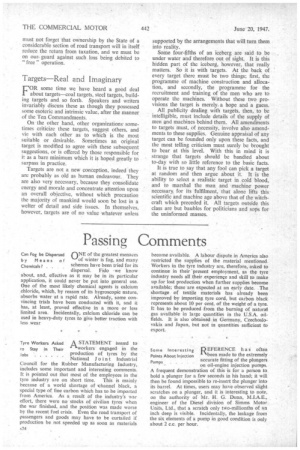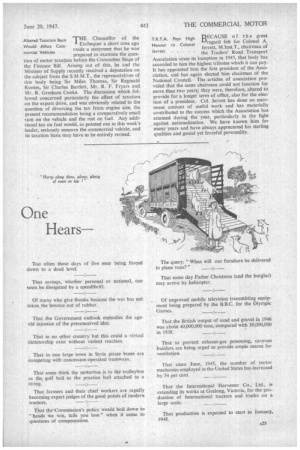Passing Comments
Page 26

Page 27

If you've noticed an error in this article please click here to report it so we can fix it.
ONE of the greatest menaces of winter is fog, and many schemes have been tried for its dispersal. Fido we know about, and, effective as it may be in its particular application, it could never be put into general use. One of the most likely chemical agents is calcium chloride, which, by reason of its hygroscopic nature, absorbs water at a rapid rate. Already, some convincing trials have been conducted with it, and it has, at least, proved effective in a more or less limited area. Incidentally, calcium chloride can be used in heavy-duty tyres to give better traction with less wear
Can Fog be Dispersed by Means of Chemicals ? . .
workers engaged in the production of tyres by the National Joint Industrial Council for the Rubber Manufacturing Industry, includes some important and interesting comments. It is pointed out that most of the employees in the tyre industry are on short time. This is mainly because of a world shortage of 'channel black, a special type of fine carbon which has to be imported from America. As a result of the industry's war effort, there were no stocks of civilian tyres when the war finished, and the position was made worse by the recent fuel crisis. Even the road transport of passengers and goods may have to be curtailed if production be not speeded up as soon as materials s24
Tyre Workers Asked to Stay in Their Jobs
become available. A labour dispute in America also restricted the supplies of the material mentioned. Workers in the tyre industry are, therefore, asked to continue in their -present employment, as the tyre industry needs all their experience and skill to make up for lost production when further supplies become available; these are expected at an early date. The shortage of textile materials has already been improved by importing tyre cord, but carbon black represents about 10 per cent. of the weight of a tyre. It has to be produced from the burning of natural gas available in large quantities in the U.S.A. oilfields. It is also obtained in Germany, Czechoslovakia and Japan, but not in quantities sufficient to export.
REFERENCE h a s often been made to the extremely
p
on oil-engine injection pumps. A frequent demonstration of this is for a person to hold a plunger for a few seconds in his hand; it will then be found impossible to re-insert the plunger into its barrel. At times, users may have observed slight scratches on a plunger, and it is interesting to note, on the authority of Mr. H. G. Dunn, M.I.A.E., engineer of the Diesel division of Simms Motor Units, Ltd., that a scratch only two-millionths of an inch deep is visible. Incidentally, the leakage from the six elements of a pump in good condition is only about 2 c.c. per hour. THE Chancellor of the Exchequer a short time ago made a statement that he was prepared to examine the question of motor taxation before the Committee Stage of the Finance Bill Arising out of this, he and the Minister of Supply recently received a deputation on the subject from the S.M.M.T., the representatives of this body being Sir Miles Thomas, Sir Reginald Rootes, Sir Charles Bartlett, Mr. •R. F. Fryars and Mr. R. Gresham Cooke. The discussion which followed concerned particularly the effect of taxation on the export drive, and was obviously related to the question of divorcing the tax from engine size, the present recommendation being a comparatively small sum on the vehicle and the rest on fuel. Any additional tax on fuel would, as pointed out in this week's leader, seriously concern the commercial vehicle, and its taxation basis may have to be entirely revised.
Altered Taxation Basis .Would Affect Commercial Vehicles
BECAUSE of the great regard felt for Colonel A. Jerrett, M.Inst.T., chairman of
the Traders' Road Transport Association since its inception in 1945, that body has accorded to him the highest tributes which it can pay. It has appointed him the first president of the Association, and has again elected him chairman of the National Council. The articles of association provided that the same chairman could not function for more than two years; they were, therefore, altered to provide for a longer term of office, also for the election of a president. Col. Jerrett has done an enormous amount of useful work and has materially contributed to the success which the Association has attained during the year, particularly in the fight against nationalization. We have known him for many years and have always appreciated his sterling qualities and genial yet forceful personality. T.R.T.A. Honour Jerrett
Pays High to Colonel












































































